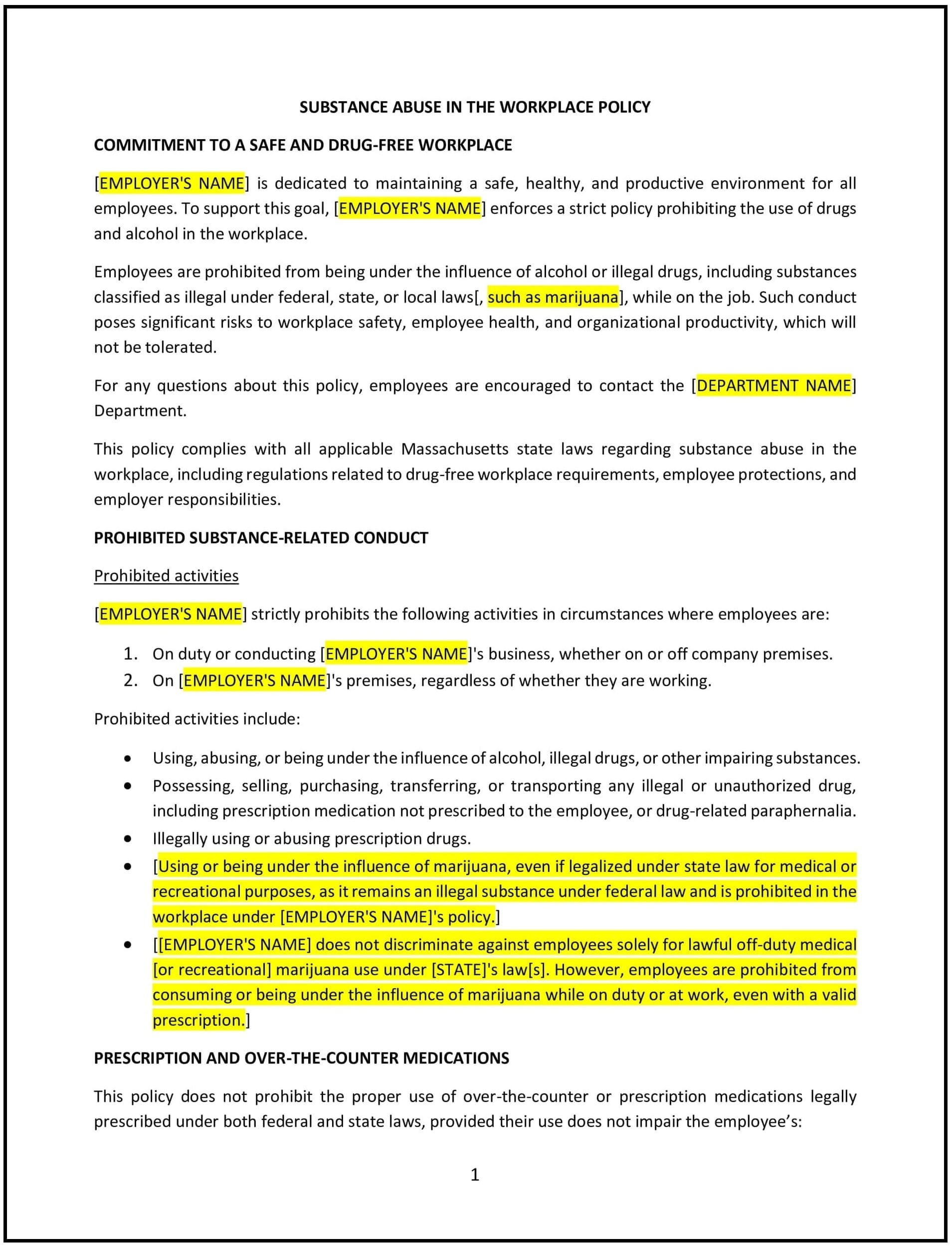Substance abuse in the workplace policy (Massachusetts): Free template
Got contracts to review? While you're here for policies, let Cobrief make contract review effortless—start your free review now.

Customize this template for free
This substance abuse in the workplace policy is designed to help Massachusetts businesses maintain a safe, productive, and healthy work environment by addressing issues related to substance abuse, including the use of drugs and alcohol in the workplace. The policy outlines the company's approach to preventing substance abuse, responding to violations, and ensuring that employees adhere to professional standards while promoting a culture of safety and respect.
By adopting this policy, businesses can mitigate the risks associated with substance abuse, comply with state and federal regulations, and support employees' well-being.
How to use this substance abuse in the workplace policy (Massachusetts)
- Define substance abuse: Clearly define what constitutes substance abuse, including the use, possession, or distribution of illegal drugs, misuse of prescription medications, and excessive consumption of alcohol. Specify that the policy applies to all employees during work hours, on company property, or while representing the company off-site.
- Address expectations and consequences: Outline the company’s expectations regarding substance use and establish the consequences of violating the policy. Employees should be informed that violations may lead to disciplinary actions, ranging from warnings to termination, depending on the severity of the offense.
- Provide support resources: Offer employees access to support programs, such as Employee Assistance Programs (EAPs), counseling, or treatment options for substance abuse issues. The policy should encourage employees to seek help voluntarily and outline the process for confidentially accessing support services.
- Conduct drug and alcohol testing: Specify when and how drug and alcohol testing will occur. This may include pre-employment testing, random testing, testing after accidents, or testing based on reasonable suspicion. The policy should outline the procedures for testing and the consequences of failing a drug or alcohol test.
- Implement reasonable suspicion procedures: Define what constitutes "reasonable suspicion" for drug or alcohol testing. This may include erratic behavior, impaired performance, or other signs that an employee may be under the influence of drugs or alcohol while at work. The policy should outline the steps for reporting concerns and conducting a fair investigation.
- Promote a drug- and alcohol-free environment: Emphasize the company’s commitment to maintaining a drug- and alcohol-free environment and creating a safe space where employees are free from the negative effects of substance abuse. The policy should support a healthy and respectful workplace culture.
- Ensure compliance with Massachusetts and federal laws: Ensure that the policy complies with Massachusetts state laws, including the Massachusetts Drug-Free Workplace Law, and federal regulations such as the Drug-Free Workplace Act and Occupational Safety and Health Administration (OSHA) guidelines.
- Review and update regularly: Periodically review and update the policy to ensure it is compliant with changes in Massachusetts state laws, federal regulations, and any changes in the company’s approach to substance abuse prevention.
Benefits of using this substance abuse in the workplace policy (Massachusetts)
This policy offers several benefits for Massachusetts businesses:
- Promotes employee health and safety: By addressing substance abuse issues, businesses can provide a safer work environment and reduce the risks associated with impaired performance, accidents, and health issues.
- Enhances productivity: Substance abuse can negatively affect employee performance, attendance, and focus. By creating a policy that addresses these concerns, businesses can improve overall productivity and employee engagement.
- Reduces workplace accidents: A drug- and alcohol-free workplace reduces the likelihood of workplace accidents caused by impaired judgment or physical coordination, ensuring a safer environment for all employees.
- Protects the company’s reputation: A clear stance on substance abuse demonstrates the company’s commitment to maintaining high ethical standards and protecting its reputation as a responsible employer.
- Supports employee well-being: By offering support for employees struggling with substance abuse, the policy fosters a culture of care and empathy, encouraging employees to seek help and recover without fear of stigma or retaliation.
- Complies with legal requirements: The policy helps businesses comply with Massachusetts state laws and federal regulations regarding substance abuse, minimizing the risk of legal challenges and liability related to substance abuse issues.
Tips for using this substance abuse in the workplace policy (Massachusetts)
- Communicate the policy clearly: Ensure that all employees are aware of the substance abuse policy and understand the company’s expectations. Include the policy in the employee handbook, and review it regularly during onboarding and training sessions.
- Provide employee support programs: Make employees aware of available resources such as counseling, rehabilitation, and Employee Assistance Programs (EAPs). Encourage employees to seek help voluntarily and ensure that they feel supported by the company.
- Train managers on recognizing signs of substance abuse: Provide training for managers on how to identify potential signs of substance abuse and how to address concerns with employees in a respectful and confidential manner.
- Implement a fair testing process: Ensure that the drug and alcohol testing process is fair, consistent, and legally compliant. Provide employees with clear guidelines on when and how testing will take place and the consequences of positive test results.
- Address violations promptly: When a violation occurs, address it promptly and fairly, following the disciplinary procedures outlined in the policy. Make sure that all actions taken are consistent with the company’s commitment to fairness and compliance with legal standards.
- Review and update regularly: Periodically review the policy to ensure it is compliant with Massachusetts state laws, federal regulations, and any changes in the company’s operations or substance abuse prevention practices. Update the policy as needed to reflect these changes.